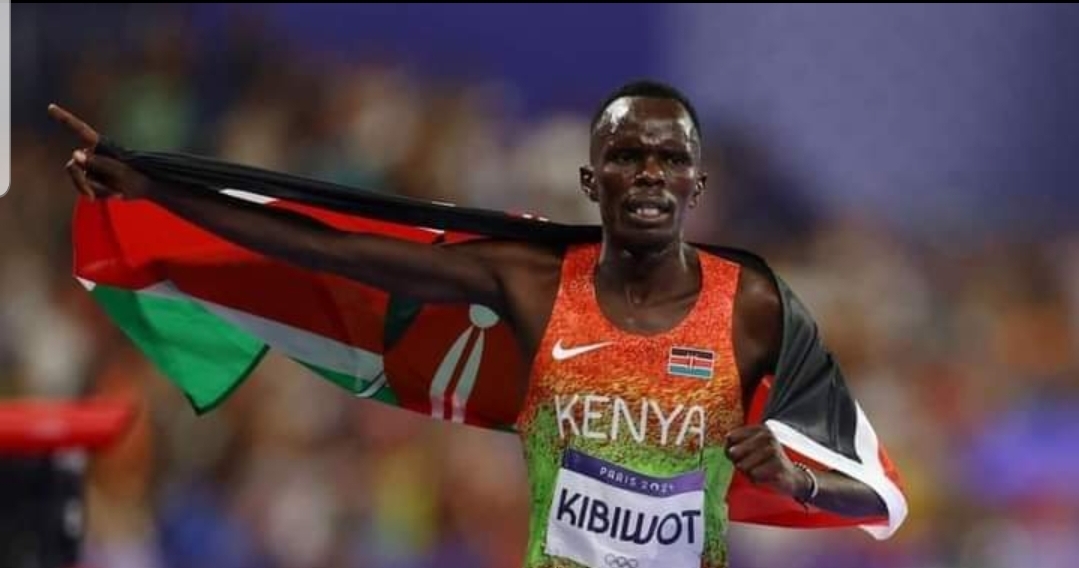After securing a bronze medal in the 3000m steeplechase at the Paris 2024 Olympics, Abraham Kibiwott has issued a clarion call to Athletics Kenya: organize a specialized training camp to help Kenyan athletes reclaim their dominance in the steeplechase. Kibiwott, who finished third in a fiercely competitive race, believes that a focused and strategic approach is essential if Kenya is to regain its historical supremacy in the event.
Kenya’s legacy in the steeplechase is well-established, tracing back to the 1968 Mexico City Olympics when Amos Biwott won the country’s first gold in the event. Over the decades, Kenya has produced numerous steeplechase champions, who have consistently set the standard in the sport. Conseslus Kipruto was the last Kenyan to claim the Olympic title, achieving this feat at the 2016 Rio Games. However, in recent years, Kenya’s grip on the steeplechase has loosened, with other nations emerging as serious contenders.
The Paris 2024 Olympics underscored this shift. Morocco’s Soufiane El Bakkali successfully defended his Olympic title, finishing the race in 8:06.05. USA’s Kenneth Rooks, a relative newcomer on the international stage, surprised many by taking the silver medal with a personal best time of 8:06.41. Kibiwott, who was Kenya’s best hope for a medal, finished closely behind in 8:06.47, securing the bronze. While a podium finish is commendable, it fell short of Kenya’s traditional dominance in the event.
Reflecting on the race, Kibiwott emphasized the need for a more strategic approach to training if Kenya is to regain its former dominance. “I would recommend that the federation (Athletics Kenya) organizes a training camp for steeplechase runners to help us train and strategize on how to beat these guys,” Kibiwott said. “In the meantime, let us all be patient. It will come.”
The steeplechase final in Paris was not without drama. Ethiopia’s world record holder, Lamecha Girma, one of the pre-race favorites, suffered a fall at the third-last barrier and was unable to finish the race. Girma’s unfortunate accident served as a reminder of the unpredictable nature of the steeplechase, where even the best can falter due to the unique challenges posed by the barriers and water jumps.
Kibiwott, reflecting on his own performance, acknowledged that while his tactics were sound, he did not anticipate the strength of the competition from unexpected quarters. “The last 300m was tough. I was watching these two guys (Girma and El Bakkali). They are very strong in the sprint,” he said. “I did my calculations right but relaxed with 200m to go, only to see the American (Rooks) breeze past. I had not put him in my plans, but now I know anybody can win at the Olympics.”
Kibiwott’s admission that he underestimated Rooks highlights the growing depth of talent in the steeplechase, with athletes from non-traditional powerhouses increasingly challenging the established order. “I never foresaw an American finishing second. I was fixated on the two (Girma and El Bakkali). I chased hard but it was too late,” he said. This realization underscores the need for Kenyan athletes to be prepared for surprises and to adapt their strategies in real-time during races.
Despite the unexpected outcome, Kibiwott expressed satisfaction with his bronze medal, especially considering his 10th-place finish at the Tokyo 2020 Olympics. “I am thankful for the bronze medal. I did my best. I never thought I would win a medal,” he added. For Kibiwott, the bronze was a hard-earned reward for years of dedication and perseverance, even as he acknowledged the need for improvement.
During the race, Kibiwott and El Bakkali were seen conversing, with Kibiwott later revealing that El Bakkali had asked him to adjust his position to avoid a potential collision. “It was tight at the time, and he asked me to push a little on the outside to avoid contact. I understood his concerns and obliged. We didn’t want to get in a situation like we have seen in this competition,” Kibiwott explained. This moment of sportsmanship highlights the mutual respect among top athletes, even as they compete fiercely for Olympic glory.
Kibiwott’s teammates, Simon Koech and Amos Serem, who were also competing in the steeplechase, finished seventh and 14th, respectively. Koech managed to set a season’s best of 8:09.26, but it wasn’t enough to challenge the leaders. Serem, meanwhile, struggled to find his rhythm in the highly competitive field, finishing well outside the medal positions.
Kibiwott’s performance in Paris, while commendable, underscores the challenges that Kenyan steeplechasers currently face. The emergence of strong competitors from Morocco, the United States, and Ethiopia has made the event more competitive than ever. To reclaim the Olympic title, Kibiwott believes that Kenyan athletes must adapt and evolve, which requires both individual effort and institutional support.
The proposed specialized training camp would provide an environment for Kenya’s top steeplechasers to focus on refining their techniques, building endurance, and developing race strategies that can counter the strengths of their rivals. It would also foster a sense of camaraderie and shared purpose among the athletes, which could be crucial in their quest to reclaim the top spot in future competitions.
Kibiwott’s call for a strategic approach to training is a reminder that while Kenya’s steeplechase legacy is strong, it cannot be taken for granted. The competition has become more intense, and the margin for error is smaller than ever. To continue the tradition of excellence in the steeplechase, Kenyan athletes and coaches must innovate and prepare with the same intensity and dedication that has defined their success in the past.
As Kibiwott and his fellow steeplechasers look ahead, the challenge is clear: to reclaim Kenya’s position as the undisputed leader in the 3000m steeplechase, one of the country’s most storied events. With the right training, strategy, and support, Kenya can once again dominate the steeplechase and bring home the gold in future Olympic Games.
ALSO READ:Away from Home: Harambee Stars to Set Up in Uganda for AFCON Qualifier


